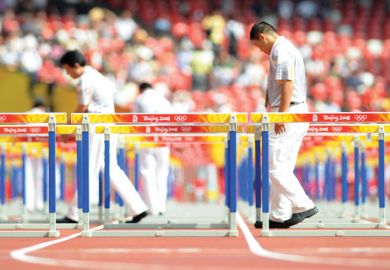The outbreak of the new coronavirus in the UK has wreaked havoc on our education system, with schools closing and university students told to go home. GCSE and A-level exams have already been cancelled, so it would not be unreasonable to assume that universities intend to follow suit. But many universities – including Oxford, where I study – are stubbornly insisting that they will be proceeding with summer exams, albeit in a new and unexpected format.
A timed, open-book online examination has been mooted as a potential solution. No details of the format of the exams have yet been released. Any chance of sitting the three-hour written exam in the format we’d been preparing for over the past three years is now over, but we don’t know quite what it’s being replaced with.
This poses problems. There are the usual issues with home study, of which the university will be well aware: some students won’t have enough space, or peace and quiet, to revise for exams, and others will have to support their families when they’re back at home.
Add to this the problem that all libraries, including those run by universities, are now closed (try doing an open-book exam when you don’t have any books). And the fact that, given the high number of international students at UK universities, a 2pm exam UK time means a 10pm exam on Hong Kong time, and a 1am exam in Sydney.
Notwithstanding these problems, most of which are common to sitting online exams at home in normal circumstances, there is the very specific problem related to the coronavirus pandemic itself: suffering.
If, as many in the media are suggesting, we are headed for a crisis on the same scale that Italy has seen, then many thousands of people are going to die (20,000 deaths is the UK government’s best case scenario), tens of thousands are going to be hospitalised and many more are likely to get ill.
A significant number of students, or their family members, will be among these figures. Try revising for an exam when you’re ill with the virus, looking after a sick loved one or praying for their recovery while they’re in hospital.
The point is that wherever students are in the UK, or the wider world, there will be a huge disparity in the circumstances facing them in the two to three months leading up to their summer exams.
Some will be able to revise in comfortable surroundings, with ample learning materials and in good health; others will be in cramped conditions, with nowhere to study and no books to study with, and they may be sick or have sick family members to tend to. And yet at present, all of them are going to be asked to sit the same exams in the same format.
Exams are supposed to be a measure of both a student’s talent and their hard work in a particular field. But what will online exams assess in these circumstances? They will end up being a reflection of the hardship facing students in the final months of their courses rather than an accurate measure of their abilities. And as such, I think the case for pressing on with them is pretty weak. The university could offer adjustments to exam results for students in difficult circumstances, but the vast range of circumstances will make this very difficult to quantify.
Many alternatives to online exams have been proposed. Some have suggested deferring the exams until quarantine measures are relaxed; some have suggested using predicted grades; and others have proposed moving to a coursework-oriented assessment.
Each of these options has its merits and demerits: deferring exams may be good for those who will struggle to study over the next few weeks, but inconvenient for those expecting to start graduate jobs later in the year; predicted grades are good for those with favourable predictions, less good for those who wanted a chance to prove themselves in exams. Each of these options will work well for some, but not for everyone.
The students’ union at Oxford is this week consulting students on the potential ways in which assessment can take place, including these alternatives.
As the consultation closes, the university faces a choice. I very much hope that, rather than pick the most popular response, the university respects the diversity of wishes by different students, which can only reflect the diversity of their circumstances.
In these dire times, institutions must give students the maximum flexibility to choose a path that works for them individually, rather than shoehorn everyone into one category that might be all right for some, but near impossible for others.
Simon Hunt is a third-year undergraduate student at the University of Oxford.
Register to continue
Why register?
- Registration is free and only takes a moment
- Once registered, you can read 3 articles a month
- Sign up for our newsletter
Subscribe
Or subscribe for unlimited access to:
- Unlimited access to news, views, insights & reviews
- Digital editions
- Digital access to THE’s university and college rankings analysis
Already registered or a current subscriber?








